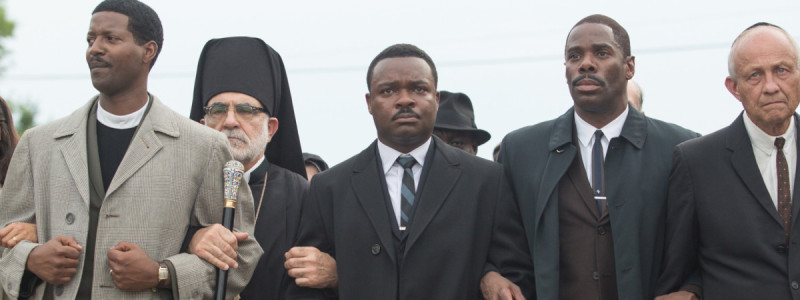It’s difficult to find a superlative that hasn’t been used to describe David Oyelowo’s performance in Selma, Ava DuVernay’s biopic of Martin Luther King, so perhaps the only word left is just superlative. Which makes it all the more incomprehensible that he wasn’t nominated for a Best Actor Oscar.
The film is about the 1965 march from Selma to Montgomery Alabama to demand the implementation of voting rights for African Americans and focuses on the marchers’ battle to cross the Edmund Pettus Bridge. It’s two years after King’s successful campaign against segregation, the March on Washington and the ‘I have a dream’ speech, and three years before his assassination. This first biopic of the black leader is an intelligent and important film and one that puts the African-American leadership at the centre of the story. There’s tension not only in the violent confrontations with savage mobs and armed police, but also in the backroom divisions and disagreements over King’s strategy of peaceful protest.
Overshadowing decisions about tactics was the constant intimidation from the vicious racist policeman and soldiers, backed up by the white-controlled courts, political system and security services, still trying to deny African Americans their legal rights. King’s wife described the constant fear as the ‘closeness of death’. There are shocking scenes of violence and none more so than re-creation of the 1963 church bombing in Alabama that killed four young African-American girls. It’s difficult to believe this was little over fifty years ago, at the same time as Carnaby Street, the Beatles and the Swinging Sixties.
It’s not just the drama of the events that grips you in Selma, but also the range of engaging and passionate characters. The performances are first class, including that of Henry G. Sanders as Cager Lee, the grandfather of young Jimmie Lee Jackson shot dead by police. Oyelowo brings moral gravitas and a sense of self-doubt and painful inevitability to the role and to the great speeches, even though these had to be rewritten because the rights to the original are held by Steven Spielberg. Oyelowo is joined by several British actors including Carmen Ejogo as Coretta Scott King, Tim Roth as the smooth but menacing Governor of Alabama, George Wallace, and Tom Wilkinson as President Lyndon B Johnson, a portrayal that has caused controversy among Johnson’s supporters.
The lyrics of Glory by Common (who also stars in the film) and John Legend, which is nominated for an Oscar for best original song, draws a timeline between Selma and Ferguson, where last year protests followed the murder of a young unarmed black man police and which followed several other murders of unarmed black men by police on American streets.
Selma is up for Best Picture, but the omission of Oyelowo remains mystifying. There may be many reasons why he wasn’t nominated, but his acting isn’t one of them. No black actor is among the 20 nominees for acting prizes at this year’s Oscars and 94 per cent academy voters are white. The most interesting explanation comes from Oyelowo himself, who suggests that the Academy only honours black actors in certain roles. Perhaps it’s still about pockets of the white establishment that continue to tremble at the presence of powerful black figures, even on film.

